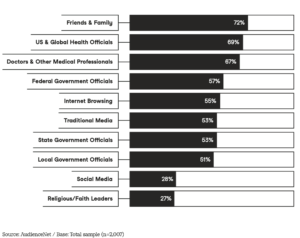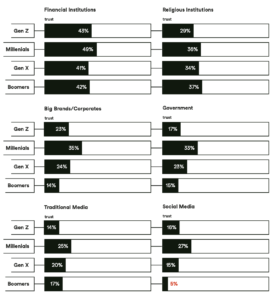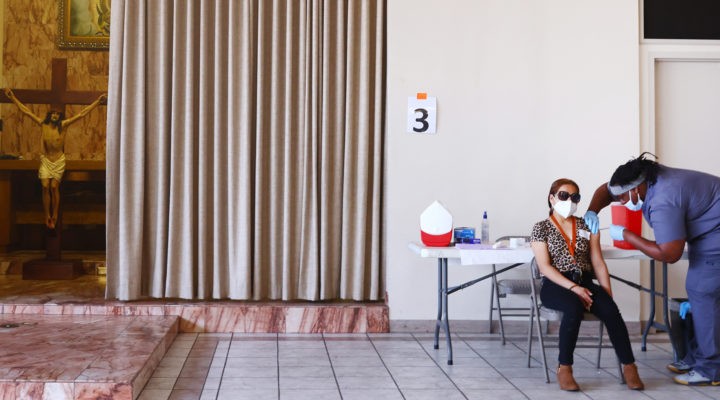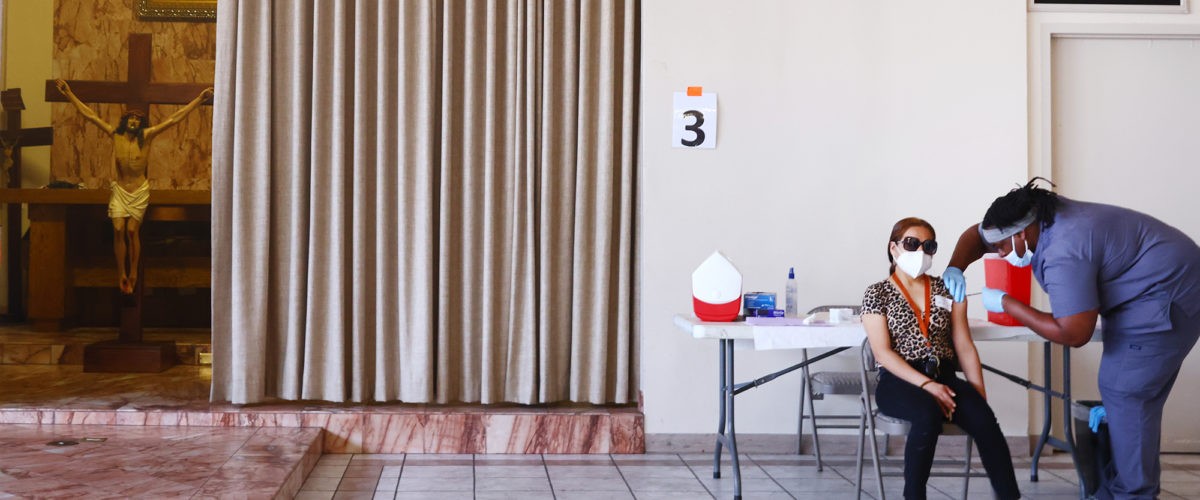Religious groups came through the COVID-19 pandemic with relatively higher levels of trust than most other institutions yet also fostered suspicion with a majority of Americans for spreading misinformation about vaccines and putting profits ahead of the well-being of local communities, new research shows.
“Notably, 35% of Americans reported feeling a sense of trust in religious/faith institutions above corporations, government, traditional and social media. Only financial institutions earned a higher percentage of respondents’ trust with 44%,” according to a November report by Coeuraj, which describes itself as “a new social good company focused on building a more equitable and sustainable world.”
The inaugural report, “Navigating Trust in U.S. Society,” is based on quarterly surveys of a fresh sample of 20,000 Americans in 2020 and 2021 to assess trust levels toward corporations, philanthropies and religious groups in addition to attitudes about vaccines and fellow citizens.
In its focus on religious originations, the study discovered that confidence in institutions of faith actually rose among some Americans during the pandemic, in many cases due to the way churches and other faith groups handled public health issues.
Confidence in institutions of faith actually rose among some Americans during the pandemic, in many cases due to the way churches and other faith groups handled public health issues.
“The 18% who had increased levels of trust in religious/faith groups expressed three main reasons for this increase: support of vaccines, local aid, and the role of religion in their life during the pandemic,” according to the report.
“Religious/faith groups advocating for their members to become vaccinated against COVID-19 made many respondents feel as if the groups put public safety first, thus increasing their trustworthiness.”
Churches and other religious groups also generated respect in some quarters by their adoption of low- and high-tech practices to operate safely in 2020 and 2021.
“Along with the vaccine, respondents mentioned religious/faith groups following social distancing measures and finding new, safe ways to operate such as church services on Zoom.”
Additionally, 48% of respondents told Coeuraj they would feel safe asking for help from members of certain religious groups if their community was struggling, and 22% said they would ask for contributions from faith institutions if a friend or family member suffered a calamity.
“Many saw religious/faith groups’ work in providing aid through programs such as food drives as proof that the groups deeply cared about their community and would work to help those in need,” the survey found. “Others found that the sense of community and shared belief provided by religious/faith groups became increasingly important during the pandemic.”
But Coeuraj also reported that 19% of respondents experienced a decrease in trust of faith organizations due to perceptions that they spread misinformation about COVID-19 vaccines and used anti-vaccine rhetoric.
“Some others felt that religious/faith groups put their own profit ahead of their members during the pandemic, or became too political, thus damaging their credibility.”
And religious leaders rated poorly overall in key areas of COVID-19 response, the study found.
 “When it came to attitudes toward vaccines, religious/faith leaders ranked last for who might influence their views/decision to get a vaccine with 27% of respondents. Friends and family (72%), health officials (67%), government (51-57%), internet browsing (56%), and traditional media (53%) were more influential than religious faith/leaders by a wide margin.”
“When it came to attitudes toward vaccines, religious/faith leaders ranked last for who might influence their views/decision to get a vaccine with 27% of respondents. Friends and family (72%), health officials (67%), government (51-57%), internet browsing (56%), and traditional media (53%) were more influential than religious faith/leaders by a wide margin.”
That view is understandable given respondents’ attitudes about the pandemic and vaccines.
“Three-quarters (75%) of the American public were personally in agreement with the notion of getting vaccinated in the midst of the global pandemic; 13% were anti-vaccination, while 12% remained neutral. Agreement across generations was generally on a continuum, increasing with age.”
But the level of distrust of religious institutions measured by the survey, at 65%, was lower than that uncovered for social media (85%), traditional media (80%), government (77%), big brands and corporations (76%).
When filtered by generation, religious groups ranked second in trust except among Gen Z Americans who “placed significantly less trust in such institutions than did all other generations (29% among Gen Z compared with one-third of all older groups).”
Financial institutions outshined others in trust across age groups. But faith organizations earned higher levels of trust in some partisan and ethnic demographics, with 48% of Republicans and 45% Pacific Islanders expressing high confidence in religious institutions.
Among those with the least confidence in faith groups were Americans of mixed race (26%), Asian Americans (27%) and Native Americans (28%), according to the survey.
 Meanwhile, Democrats and African Americans (each at 34%) had only slightly less trust in religious groups than males and white Americans (each 37%). Only 33% of females expressed confidence in faith organizations, the survey said.
Meanwhile, Democrats and African Americans (each at 34%) had only slightly less trust in religious groups than males and white Americans (each 37%). Only 33% of females expressed confidence in faith organizations, the survey said.
Coeuraj acknowledged the fissures in trust uncovered in its survey, but added that it also found positives that can be built upon.
“While our trust in the future has been tested over the past year, surprisingly the data showed overall that trust increased during the pandemic — not only in how much family, friends and community members trust one another, but also in institutions.”
Those findings, the report added, offer “opportunity and hope amidst the political rancor.”
Related articles:
Most comprehensive study yet of COVID’s impact on churches finds uneven results
Largest-ever U.S. congregational survey confirms what church consultants have been telling you
How will your church rebuild after the disaster of the past year and a half? | Opinion by Mark Wingfield


